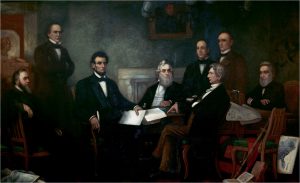In 1864, Abraham Lincoln said that if slavery was not wrong, then nothing was. Despite this, some people doubt if he deserves to be called the emancipator. After Lincoln became president, he waited for two years to pass before issuing the Emancipation Proclamation.
Lincoln felt that slavery was fundamentally an economic problem, not a racial one. Slavery made people do work that they did not want to do, and the results of their work were taken away from them. When he was a young boy, Lincoln’s father, Thomas, rented out young Abraham to neighbors to do work for them. Thomas would then take all the money paid by the neighbors and not give anything to Abraham. When Lincoln was a grown man, he said he could remember well the first time he earned his first money. He said it was when he rowed two people towards a steamboat. Lincoln recalled that he was paid two silver half dollars for his labor. As a result of earning his first pay, Lincoln said he felt that the world seemed brighter and full of possibilities.
Lincoln felt that the institution of slavery was based on exploitation and that exploitation was carried out by force. He said that slavery was an economic problem and was beyond the issue of race.
In 1858, Lincoln said that he used to be a slave. He was perhaps referring to how his father rented him out to neighbors to do work. Lincoln further said that now he was a free man, so much so that the world was letting him work as an attorney. Lincoln said that although he did not have plans to promote social and political equality between black and white people, he believed that any man who had labored had the right to eat food that he had earned through his labor. In this sense, Lincoln stated that any African American has equal rights as any white man.
Before the American Civil War erupted, Abraham Lincoln worried deeply about what to do with slavery. Back then, there were 34 states in the United States. Out of these thirty-four, nineteen were free states, while fifteen were slave states. Lincoln reasoned that the most effective way to end slavery was to contain it in the states where it was legal and not let any slave state join the Union. However, slave-holding states objected to being contained. As a result, when Lincoln assumed the presidency in 1860, eleven slave states banded together and called themselves the Confederate States of America. And so, the American Civil War erupted.
Being president of the United States did not automatically give Lincoln straightforward constitutional power to dissolve state laws that protected slavery. As a result, Lincoln resorted to what he called using his “war powers.” By using these war powers, he would be able to issue a proclamation of emancipation. And in doing so, he would be using his presidential power as commander-in-chief and not as a president using his civilian power. Another problem that Lincoln faced was that no president before him had ever tried using war powers. However, Lincoln felt that the window of time to solve the problem of slavery was quickly closing. He became increasingly worried that if the slaves were not freed, the Union itself would not survive.
On the 22nd of July 1862, he presented a draft of the Emancipation Proclamation to his cabinet members. Then, on the 1st of January 1863, he enacted it into law. However, there were four slave states that did not join the Confederacy. The proclamation enabled by the war powers could not be enforced in states that did not join the rebellion. And so, only slaves that were under the Confederate States could be freed. In 1864, fortunately for the Union, Lincoln was able to gain the authority to push for a change in the constitution to end slavery in all states.
Historians are aware that Lincoln did not single-handedly take down the institution of slavery. He was helped by a multitude of other great men in his endeavors to do so. However, it was his legalistic approach to demolishing slavery that made him stand out as the great emancipator of slaves.
